Iranian Artist Reveals Brutal Torture, Forced Confession
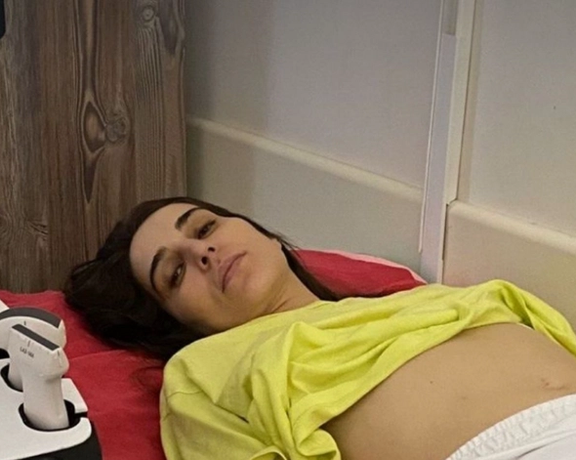
An Iranian artist arrested during the Women, Life, Freedom protests has spoken of the severe torture she endured in custody.

An Iranian artist arrested during the Women, Life, Freedom protests has spoken of the severe torture she endured in custody.
Now in exile in Turkey after fleeing Iran, Elham Modarresi was arrested last November on charges such as vandalism of facilities, anti-government propaganda, disrupting public order and inciting people to kill.
In January, rights activists Hengaw told of her hunger strike while imprisoned at Karaj's Kachoui prison. During her detention, the artist originally from Kurdish province Sanandaj, was deprived of the right to access a lawyer as well as her case, and she also suffered from liver and intestinal disease, the group said.
In her latest update from Turkey, Modarresi revealed that during her imprisonment, she was subjected to severe physical torture, including brutal beatings that led to internal bleeding.
Minority Kurdish Iranians have historically been treated with extreme oppression under the regime, as a recent report revealed at length.
The artist was temporarily released from Karaj's Kachoui prison on January 22, with bail posted, allowing her to escape.
In a message shared on the X network, Modarresi said, "12 Iranian security agents stormed our house, violently pushed my mother, put handguns against my mother and brother's heads, blindfolded me, and took me away."
She spoke of how intelligence officers destroyed her ultrasound records, concealing the abuse, and the recurrent threats of sexual violence, part of systematic state sanctioned sexual violence well documented by Iran's Me Too movement.
Throughout her time in prison, Modarresi was denied access to medication and medical care as the regime pressured her into a forced confession.
She now faces an uncertain future with no guarantees of safety in Turkey and has pleaded for help to find refuge.
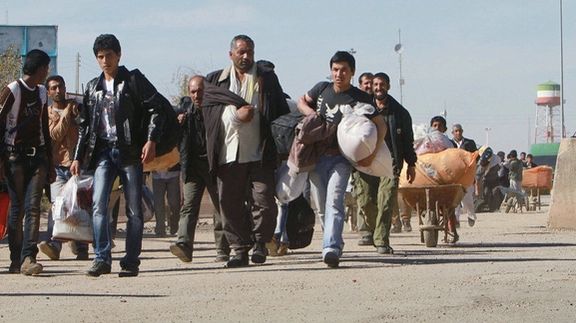
An official on Sunday told the parliament that immigrants in Iran number over 8 million despite interior minister’s much lower figure of five million last month.
Interior minister Ahmad Vahidi had reported this lower figure on September 27, stating that there were "around five million Afghans in Iran." However, Mohsen Najafikhah provided a substantially higher estimate of 8.4 million immigrants.
Afghans, often referred to simply as ‘foreign nationals’ by officials and the media, make up the majority of immigrants in Iran. The census of 2016 found the presence of over 1.5 million Afghans followed by 34,500 Iraqis and 14,320 Pakistanis.
“The question is whether the number of foreign nationals in the country has increased since [September] or the statistics offered by the interior minister was not right,” Faraz Daily news website asked Monday.
Afghans first came to Iran as refugees in early 1980s and later as economic migrants but before the Taliban takeover of the government in Afghanistan in 2021 their numbers rarely rose above two million. Around 780,000 had obtained refugee status and were not considered illegals.
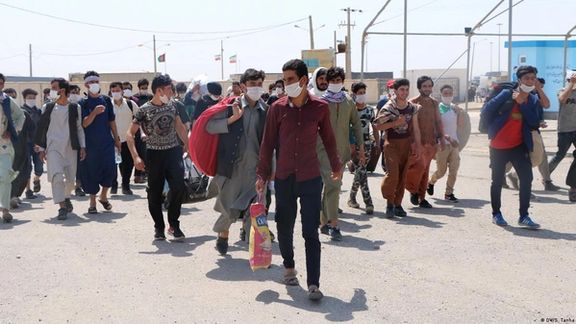
In April 2022, Javad Hedayati, the director general of the International Transit Bureau of the Transportation Organization, reported a significant increase in the number of Afghans entering Iran through official borders since the Taliban takeover. He stated that the number had risen to as many as 5,000, compared to the previous range of 700-800. Notably, there were no available statistics on the number of illegal immigrants.
The government has not taken any steps to slow down the deluge of refugees, leading to accusations that the clerical regime might have sinister plans to use the Afghans, who speak Persian, for political or military aims.
In late September, a member of the parliament’s National Security and Foreign Policy Committee, Mahmoud Ahmadi-Bighash, disclosed plans to grant Iranian citizenship to legal Afghan immigrants. Ahmadi-Bighash claimed they number between eight to ten million.
According to Ahmadi-Bighash, a former governor of the northeastern North Khorasan Province, the primary aim of the plan is “population transfer” and legalizing the presence of millions of Afghan immigrants.
Referring to the parliament’s approval of a bill to establish a “national immigration organization” in November 2022, he claimed that those behind the plan want to “facilitate the entry and residence” of Afghan citizens.
In recent weeks, the government’s political rivals have repeatedly warned about its “open borders” policy and the possibility of hidden agenda with hardliners responding to such criticism by accusing critics of inciting “Afghan-phobia” amid fast-growing anti-Afghan sentiments on social media and violence against the immigrants.
Some government critics claim authorities are actively encouraging the growth of the Afghan population with incentives such as subsidized energy and food to remedy the problem of population decline or even to bolster its military by recruiting young Shiite Hazara Afghans.
During the Sunday session, lawmakers assigned the interior ministry the task of establishing a national immigration organization in collaboration with the Secretariat of the Supreme National Security Council.
The government claims that by forming such an organization it will be able to “systematize” the data on foreign nationals’ entry, exit and expulsion for which, according to Najafikhah, ten different government departments are currently responsible.
Government’s critics allege that the plan may be a cover for naturalizing Afghans in Iran. “A national immigration organization, if formed, can easily turn into an organization for issuing residence permits,” Faraz Daily’s report said.
The report pointed out that the government bill includes provisions for offering a series of services – including access to national insurance and benefits – to foreign nationals without citation of allocated budget.
“It is not clear whether the country’s economy is capable of offering these services to so many immigrants, just the same as it is still not clear how many of the 8.4 million are legal immigrants and how many are illegal (undocumented),” the report said.
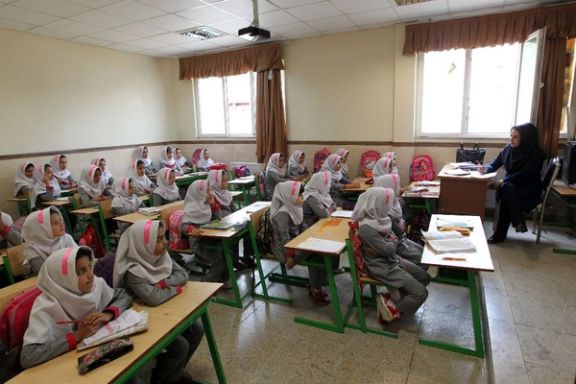
One month into the new school year, Iran is still facing a critical shortage of teachers while 10,000 classrooms remain without instructors.
On Wednesday, the Fararu website conducted an in-depth examination of the alarming crisis, shedding light on the repeated inconsistencies in promises made by the education minister and the lack of a precise plan to address the ministry's issues under the leadership of Reza-Morad Sahraei.
According to recent statements from regime officials, there is a shortfall of around 250,000 to 300,000 teachers, affecting roughly 16 million students across all grade levels. In the province of Tehran alone, the shortage of teachers is estimated to be around 4,000.
Sistan and Baluchestan province, classified as one of the most underprivileged areas in terms of education, requires an urgent influx of 15,000 teachers.
Fararu has reported that the concerning statistics have prompted 30 members of parliament to sign a motion seeking the impeachment of Sahraei. However, the motion has yet to proceed to the implementation stage.
According to the report, the current issues plaguing education and training are partly attributed to the widespread retirement of teachers in previous years and the government's discontinuation of teacher recruitment efforts.

Iran’s ruler Ali Khamenei on Wednesday once again praised the militant group Hamas for its terror attack on Israel and said that Palestinians will ultimately win.
Speaking at a gathering in Tehran, the anti-Israel and anti-West leader of the Islamic Republic, also accused the United States of being a partner in what he called Israeli crimes.
With his usual rhetoric, Khamenei said, “The wounded and wrecked occupier regime seeks revenge for the blows dealt by the resilient Palestinian fighters in Gaza, but undoubtedly, despite all the support of the wicked oppressors and the explicit collusion of the Americans in the crimes of the Zionists, all this injustice and aggression ultimately leads to nowhere, and in these matters and future events, victory belongs to the Palestinian nation."
The Iranian regime immediately congratulated Hamas on October 7, as the news of the terror raid and the mass killing of civilians was being received. Later, the government organized street celebrations and began issuing statements of support for Hamas and threats against Israel and the United States.
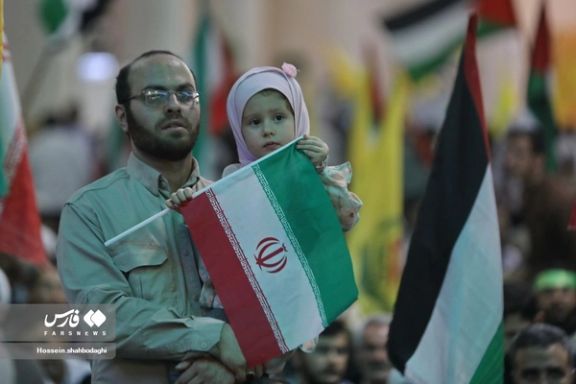
Khamenei on Wednesday described the attack on Israel as “defining and unprecedented.” He stated that with the passage of time, “the irreparability of this operation becomes more evident." He praised the “perseverance of the people of Gaza” and said that this will eventually “defeat the enemy.”
He claimed that leaders of “usurper and oppressor” governments are visiting Israel to save it from complete annihilation. "The evildoers around the world see that the Zionist regime is in a state of struggle and destruction due to the powerful and defining blow delivered by Palestinian fighters. For this reason, they are trying to forcibly keep the wounded and wreaked regime afloat through these visits, expressions of solidarity, and the provision of tools of crime such as bombs and other weaponry."
The 83-year-old Iranian dictator accused the United States of being a “partner in crime” with Israel. "The hands of the Americans are tainted with the blood of children, women, and other martyrs of Gaza, and in reality, the Americans are managing these crimes."
The Biden administration has warned Iran and Hezbollah not to get involved in the fighting and not to expand the war, although the militant Lebanese organization has already attacked some targets in Israel. The administration has deployed two powerful naval task forces in the eastern Mediterranean, which could be a deterrence against a potential barrage of missiles by Hezbollah.
Khamenei also called on Arab and Muslim governments to not lose their will in the face of “Western propaganda” and refrain from calling Palestinians terrorists.
Israel on Wednesday accused Iran of orchestrating recent attacks carried out by its proxies in Yemen, Iraq, and Lebanon in addition to supporting Hamas' war on Israel.
Israeli Chief Military Spokesperson Rear Admiral Daniel Hagari said: “Iran supported Hamas before the war directly, in training, in providing weapons, money and technological know-how. Even in these moments, Iranian support to Hamas continues with intelligence assistance alongside incitement on social media and fueling incitement worldwide against the State of Israel," he said.
Clearly naming Iran as the culprit of regional destabilization, he added; "In the Middle East where the Iranian proxies operate from within Iraq, Yemen and Lebanon, the instructions come from only one place — from Iran."
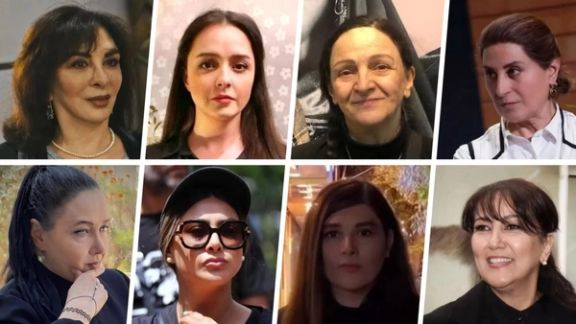
Iran has officially released a list of actresses who are now prohibited from working in the film industry due to refusal to wear the mandatory hijab.
The announcement follows months of uncertainty and conflicting statements from authorities associated with the culture ministry.
The director of the Supervision Department, Habib Ilbeigi, made the formal declaration on Tuesday, announcing that actresses who have defied hijab standards would no longer be allowed to participate in new film projects.
"Due to the constraints they confront, these actresses will no longer be able to pursue their careers in cinema. Nevertheless, their previous works will be gradually released to safeguard the interests of film producers, given the substantial investments made in these projects. However, they will be barred from participating in any forthcoming film productions," he said.
The list of affected actresses includes several well-known figures in the Iranian film industry, such as Baran Kosari, Vishka Asayesh, Taraneh Alidousti, Katayoun Riahi, Panteha Bahram, Hengameh Ghaziani, Pegah Ahangarani, and more.
In the wake of protests that erupted following the death of Mahsa Amini in custody last year, several female actresses have shown solidarity by sharing images of themselves without the obligatory hijab. Their acts of defiance have caused tensions with the Islamic Republic's state broadcaster, leading to the removal of them from TV sitcoms and movies in which they had previously appeared, or the discontinuation of the shows altogether.
Celebrities from the world of culture and entertainment as well as athletes, have come under huge pressure from the government since the uprising began last year, with punishments including pay cuts, bank account freezes and work bans. Some have even fled to exile after public displays of support for the Women, Life, Freedom movement on the world stage.
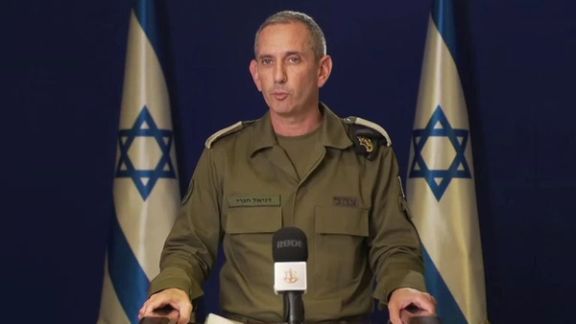
Israel has accused Iran of orchestrating recent attacks carried out by its proxies in Yemen, Iraq, and Lebanon in addition to supporting Hamas' war on Israel.
Israeli Chief Military Spokesperson Rear Admiral Daniel Hagari said: “Iran supported Hamas before the war directly, in training, in providing weapons, money and technological know-how. Even in these moments, Iranian support to Hamas continues with intelligence assistance alongside incitement on social media and fueling incitement worldwide against the State of Israel," he said.
Clearly naming Iran as the culprit of regional destabilization, he added; "In the Middle East where the Iranian proxies operate from within Iraq, Yemen and Lebanon, the instructions come from only one place — from Iran."
While Tehran continues to deny its hand in the war declared by Hamas on October 7, when thousands of Hamas militants stormed Israel by land, sea and air, massacring at least 1,400 and taking around 220 hostages, Hagari warned: "Whomever destabilizes the Middle East for the actions of the Hamas - ISIS criminals, cannot hide.“
Meanwhile, as Iran's biggest proxy, Hezbollah, continues to increase its attacks on northern Israel from Lebanon, the group announced that its leader in Lebanon, Sayyed Hassan Nasrallah, held discussions with top leaders of Palestinian militant factions Hamas and Islamic Jihad.
Hamas deputy chief Saleh al-Arouri and Islamic Jihad chief Ziad al-Nakhala met with Nasrallah as the proxies' alliance continues since Hamas declared war on Israel on October 7.
Iran is Hamas' biggest backer, giving over $100m a year in addition to weapons, technology, expertise, and training, which facilitates its attacks against Israel.
Since the war broke out, Yemen's Houthi militia has fired missiles towards Israel, intercepted by the US and Saudi Arabia. American forces in Iraq and Syria have come under attack from Iranian proxies 13 times in the last week. The US, one of the regime's archenemies alongside Israel, has vowed to support Israel in its war on terror group Hamas leading to a stepping up of Iran's regional militias.